Author: John Stuligross
FoodShare Benefits Restore Dignity to Wisconsin Veteran
Posted by John Stuligross in on Apr 4, 2017 Tagged:
Cassie, a FoodShare Outreach Specialist with Feeding America Eastern Wisconsin, conducts outreach and provides application assistance in Brown, Outagamie, Winnebago and Fond du Lac counties. Each person she meets with has their own uniquely powerful story and life circumstances.
Cassie met Michael at a Winnebago food pantry in April. She was sitting at a table and handing information to people interested in the FoodShare program. As Michael entered the food pantry, Cassie could tell he was a bit uncomfortable there. She approached Michael to see if he was currently entolled in FoodShare.
As a former Marine, Michael was not used to asking for help or assistance from anyone, so the idea of using a food pantry was very foreign to him. He is a two-time cancer survivor and developed PTSD from his time overseas. Michael also suffers from severe anxiety. These struggles make it difficult for him to find sustainable employment, and currently finds himself out of work. His medical bills continue to climb as he seeks treatment for his mental health disorders and is struggling to make ends meet. After meeting with Michael in a private corner of the food pantry, learning about his circumstances, and realizing that he might be eligible for FoodShare, she helped him apply online.
Later that month, Cassie saw Michael again at the same food pantry. Thanking her for helping him, he shared that he was approved for FoodShare and that having money to purchase groceries now provides a sense of normalcy and dignity. With bills piling up, he says anything will help and he never knew FoodShare was an option.
While it is easy to make judgements about “those people” on the FoodShare program, more often than not, FoodShare recipients share similar stories with Michael. Some FoodShare recipients are military veterans. Others are families whose head of household recently lost employment due to layoffs. Still more, many recipients are seniors on a fixed income, or adults working full time just not earning enough through their employer to cover all of their bills. Our FoodShare specialists work on the front lines and hear these stories, and provide assistance with FoodShare applications as a line of defense against hunger.
Read MoreWhat You Need to Know About FoodShare & Immigration
Posted by John Stuligross in on Mar 4, 2017 Tagged:

There has been a lot of talk in the news recently regarding immigration reforms and policy changes. It’s difficult to stay current on what’s real and what’s speculation. Immigration is an important issue in Wisconsin, and we would like to help dispel the confusion, myths and misunderstandings about FoodShare citizenship eligibility.
Who is eligible for FoodShare?
In order to be eligible for FoodShare, an individual must be either a U.S. citizen (born in the U.S. or a naturalized citizen of the U.S.), a derivative citizen (born outside of the U.S. to, or adopted by, a U.S. citizen), or a non-citizen with a qualifying immigration status. A qualifying immigration status typically means a legal permanent U.S. resident of at least 5 years. Other examples include refugees, asylees, and trafficking victims.
Ineligible immigrants include visitors and tourists, persons illegally in the U.S., students with student visas, and immigrants who refuse to provide the documentation required to verify their qualifying immigration status.
Households with mixed citizenship
If a person in a FoodShare unit does not meet the citizen/immigration eligibility requirement, others in the household that do meet the requirements can still apply for FoodShare. The ineligible person is not counted as a member of the food unit, but his/her income must be reported on the FoodShare application to determine the household’s eligibility.
If a person meeting the citizen/immigration eligibility requirements is living with someone who does not, FoodShare does not penalize that person. Local and state agencies do not report anyone to the U.S. Citizenship and Immigration Services (USCIS). This means that if a FoodShare application includes an illegal immigrant in the household, the FoodShare program will not report that individual or household to USCIS.
Where to get more help
Our FoodShare Helpline is available to help answer questions about FoodShare policies regardless of immigrant status, and we provide confidential application assistance for eligible households. For more information on immigration policies, call our toll-free confidential FoodShare Helpline at 1-877-366-3635 or visit www.getaquestcard.com.
Read MoreFoodShare Outreach: The Basics
Posted by John Stuligross in on Mar 4, 2017 Tagged:
Feeding Wisconsin and its member food banks understand that everyone needs a helping hand at times. Our member food banks work with over 1,000 local food pantries and meal sites to provide food to over 600,000 of our friends and neighbors each year. To further reduce the burden of hunger, we provide a robust FoodShare outreach program that provides education and application assistance across the state.
FoodShare is Wisconsin’s nutrition assistance program funded under the federal Supplemental Nutrition Assistance Program (SNAP), formerly called food stamps. The program is available for individuals or households with limited gross incomes. If enrolled, a household automatically receives a certain amount of money each month to their “QUEST” card, which looks and acts like a debit card. The QUEST card can only be used to purchase groceries and food items, and is accepted at most retailers (including Walmart, grocery stores, and convenience stores). Currently, over 700,000 Wisconsinites are enrolled in the FoodShare program. Despite the high participation rate of FoodShare recipients, tens of thousands of people are currently not receiving benefits, even though they are eligible.
We have come to learn that people do not apply for three main reasons:
The application process is confusing and overwhelming
Misunderstanding about who is eligible and what the benefits provide
Negative stigma from others or self-pride
To help address these barriers, Feeding Wisconsin and its food banks have banded together to help navigate the application process, educate folks about who is eligible, and dispel any myths and stereotypes about the program and its members.
With eight FoodShare Outreach Specialists strategically located across the state to provide application assistance, plus a fully staffed toll-free FoodShare Helpline, Feeding Wisconsin and its member food banks are available to anyone that seeks information and assistance for FoodShare. We provide in-person assistance in a 16-county service area surrounding the Madison area (Adams, Columbia, Crawford, Dane, Dodge, Iowa, Jefferson, Juneau, Lafayette, Grant, Green, Monroe, Rock, Richland, Sauk, and Vernon counties), as well as four counties in the Fox Valley (Brown, Fond du Lac, Outagamie and Winnebago counties), and six counties in the Chippewa Valley (Chippewa, Clark, Eau Claire, Jackson, and Trempealeau counties). In total, we offer in-person application assistance in 26 counties in the state.
We also provide telephone assistance through our toll-free FoodShare Helpline (1-877-366-3635). Our Helpline staff can answer questions, schedule appointments, and help people apply for FoodShare, regardless of what county they reside.
We encourage you to refer clients to our helpline or to our website, www.getaquestcard.org to learn more about FoodShare or to apply for benefits!
Read MoreUpdated FoodShare Income Limits
Posted by John Stuligross in on Nov 1, 2016 Tagged:
Every October, at the start of each federal fiscal year, the United States Department of Agriculture (USDA) updates the income limits for SNAP benefits across Wisconsin and the income deductions for various expenses, such as shelter costs, medical expenses for people over 60 or who are receiving federal disability benefits, dependent care, child support, and others.
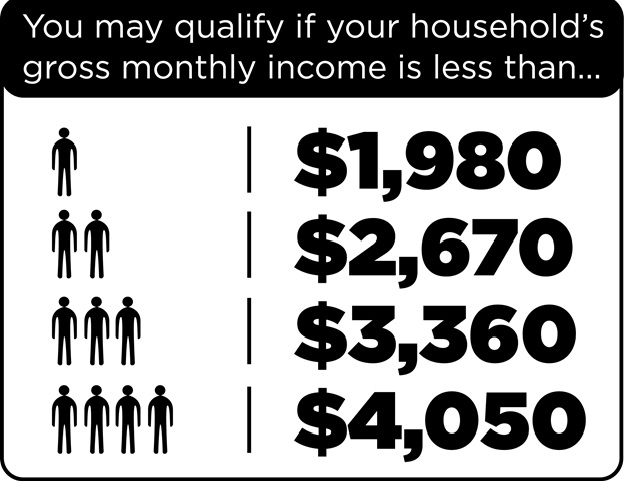 This year, the maximum gross monthly income has increased slightly as compared to last year.
This year, the maximum gross monthly income has increased slightly as compared to last year.
The chart to the left outlines the eligibility limits for most households. The increase in the gross monthly limit means that some households that were not eligible for FoodShare last year may now be eligible for benefits.
FoodShare Allotments
The minimum allotment, or amount of money that a single person household unit or FoodShare case can receive by DHS, is $16 per month. This is the same minimum allotment as the previous year.
The maximum allotment for a single person household is $194, also the same as last year. At this time, the state allows FoodShare allotments to be carried over each month up to a maximum of one year, at which time the account will be reset to zero.
For more information visit Wisconsin Department of Health Services website: https://www.dhs.wisconsin.gov/foodshare/fpl.htm
Read MoreReflections from year one
Posted by John Stuligross in on Nov 1, 2016 Tagged:
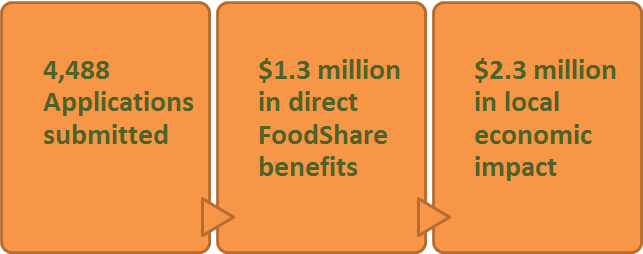
Where we’ve been
It’s hard to believe we’ve already closed out our first year as a statewide FoodShare outreach program. In our first year we had a number of accomplishments worth celebrating. Most importantly, we have grown our outreach program to provide services to our friends and neighbors in all 72 counties in Wisconsin. With a statewide team of 11 FoodShare Outreach staff providing in-person assistance in 24 counties, more people are able to receive personalized assistance with their applications.
Since October 2015, the FoodShare Helpline has received over 5,400 calls with inquiries about our program including at least one call from 71 out of 72 Wisconsin counties. Our program assisted with over 850 applications and helped over 1,700 individuals gain access to FoodShare benefits over the past year. These applications were submitted by specialists on the FoodShare Helpline or with Feed My People food bank or Feeding America Eastern Wisconsin. These efforts have helped contribute 500,000 meals for our friends and neighbors, over $2.3 million in local economic impact, and nearly $1.3 million in direct FoodShare benefits.
The average FoodShare benefit that our friends and neighbors received with our help is also striking. Although the minimum allotment an individual can receive is $16 per month, the average allotment applicants receive with our assistance is over $100 per month. These benefits allow our friends and neighbors to purchase nutritious food at grocery stores, contributing to healthier, less stressful lives.
Statewide, our six food banks, including Second Harvest Foodbank of Southern Wisconsin, and our Helpline collectively assisted over 4,488 total applications and helped over 9,000 individuals gain access to FoodShare.
Recognizing the value of FoodShare, from a public health perspective and as a hunger-fighting tool, our food banks and Helpline utilized several outreach strategies. We distributed over 300,000 flyers to food pantries and partner organizations, and sent direct mailings to 78,000 letters to low income friends across the state. Food pantries as far south as Kenosha and as far north as Iron County are reaching out to their members and informing them about our FoodShare services.
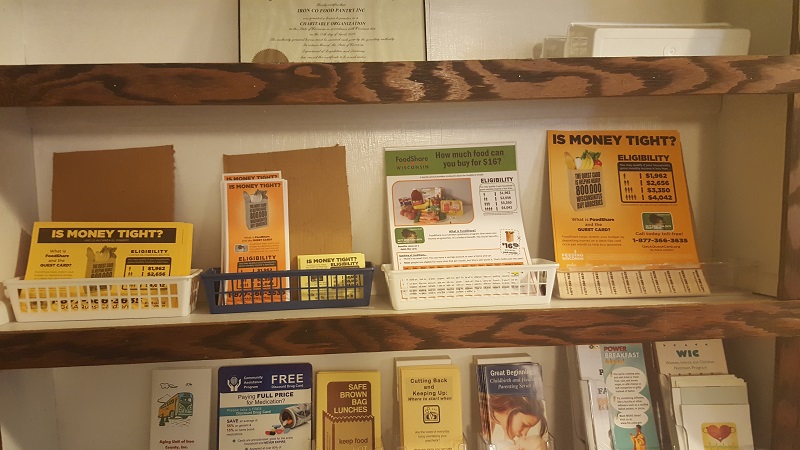
(Above: Iron County Food Pantry in Montreal, Wisconsin, displaying FoodShare Outreach flyers for their patrons)
Additionally, we continue to develop new and innovative ways to advertise our services across the state. These include enabling our Helpline staff to send text message to our program's members, utilizing online referrals, and employing other internet-based strategies. We will continue to identify the needs of our communities and adapt our outreach practices to meet their needs.
Where we’re going
We are tremendously proud of our growth over the past twelve months. However, our data suggest some 50,000 individuals in the state are still in need of FoodShare benefits. Feeding Wisconsin and its participating food banks will continue to deploy a variety of outreach strategies until the need is met. We firmly believe FoodShare is the most effective anti-hunger fighting tool in our toolbox.
Our member food banks are committed to ending hunger. You will continue to see Feeding Wisconsin reaching out to new partner organizations to advertise and market our FoodShare helpline. Our friends and neighbors will continue seeing our dedicated FoodShare outreach specialists in the field talking with FoodShare members and applicants.
As we grow our program, we’re looking to build even stronger statewide partnerships to spread our message, share our helpline number, and ultimately reach those in need of FoodShare.
If you would like to support the Feeding Wisconsin FoodShare Outreach program and partner with our helpline or specialists, please contact John Stuligross (608-960-4517; jstuligross@feedingwi.org).
Read MoreBetty's Story
Posted by John Stuligross in on Nov 1, 2016 Tagged:
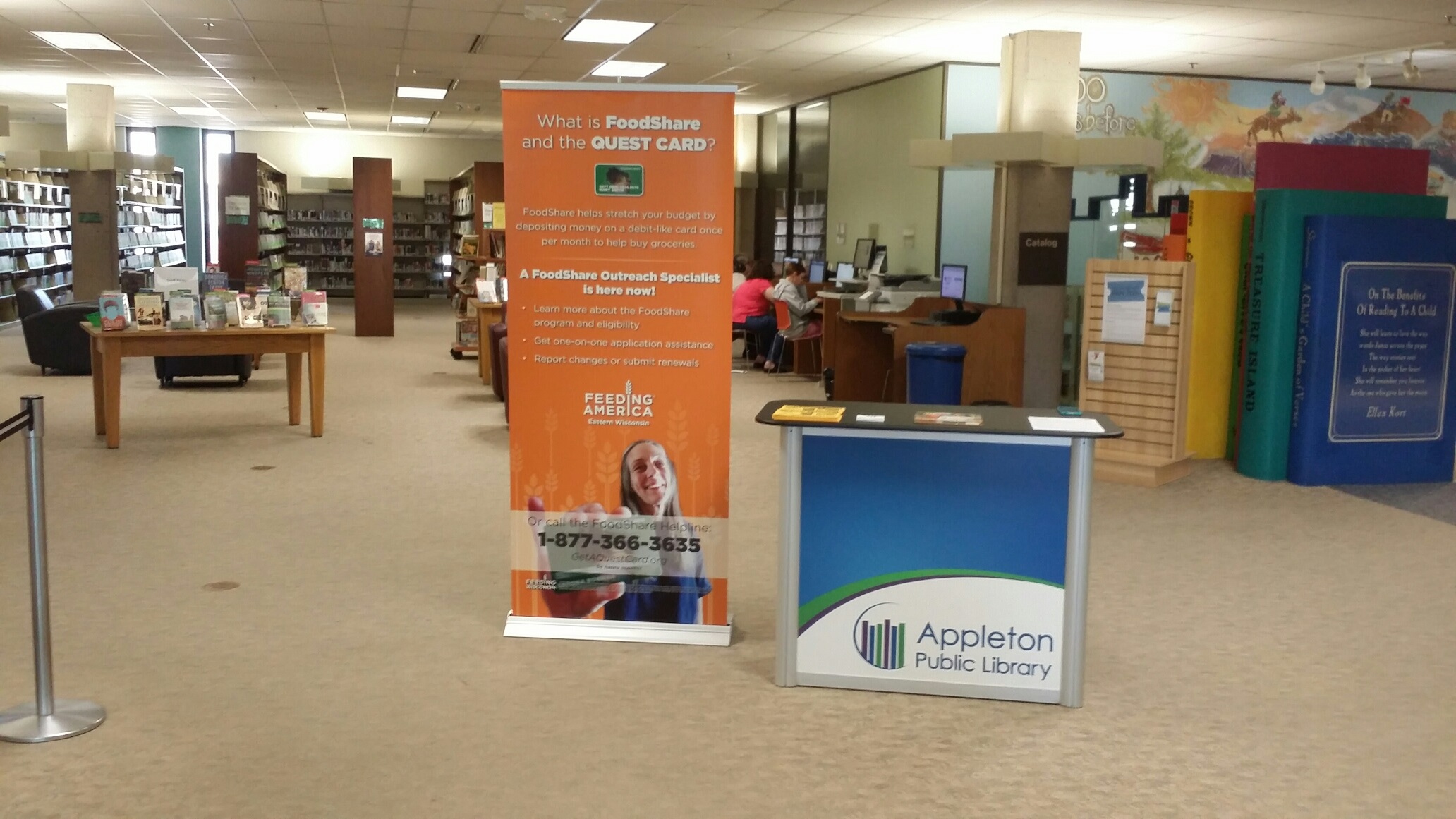
Over the past several months, Andrew, a FoodShare Outreach specialist in Brown, Outagamie, Fond du Lac, and Winnebago counties, has helped of our friends and neighbors, including a family of four struggling to make ends meet, a senior couple living on social security benefits unable to pay for medical bills, and a homeless disabled veteran needing support from his community. Like all outreach specialists, Andrew takes pride in the small, but powerful part they play in applicants’ lives by connecting them to resources to purchase food.
Andrew had been regularly providing on-site application assistance at the Appleton Public Library. In May 2016, Betty from Appleton mustered up the courage to talk with Andrew at the library. Betty explained that she was previously on FoodShare, receiving around $190 per month in benefits. However, due to recent changes in FoodShare policies, Betty lost her benefits for non-compliance.
The implementation of the work requirement for Able-Bodied Adults without Dependents (ABAWDs, or more commonly, single adults without children) caused a lot of confusion among FoodShare recipients, including Betty.
Not only was the requirement confusing, Betty had also not received notification that the rules changed because she was homeless and was not receiving mail. Between the rule changes, the stress and hardship of homelessness, and her clinical diagnosis of bi-polar disorder, Betty lost her benefits and was unable to purchase healthy, nutritious food on a regular basis and was hungry.
Andrew spent an hour with Betty. He listened to her story and sorted through the FoodShare policies to determine how best to help her. Andrew discovered that Betty had lost benefits due to the ABAWD policy, which requires single adults without children to work at least 80 hours per month or receive an exemption. Betty was not working and since she did not receive notice, she hadn’t applied for an exemption to the rule.
But Betty qualified for a number of exemptions and together, Betty and Andrew called the appropriate state and county offices and explained her situation. Not only was Betty reinstated in the FoodShare program, but she was also eligible for expedited services and was provided a temporary QUEST card that same day.
In learning this good news, Betty was overcome with tears of joy and thankfulness. She was finally able to purchase her own food again. Without Andrew’s assistance, Betty may still be without FoodShare and struggling to pay for food.
Our FoodShare specialists know that connecting applicants with resources creates a ripple effect. Now that Betty knows more about the FoodShare program, its rules, and regulations, she has become an advocate herself and is helping her friends learn more about the program.
Read MoreAdvocating with Clients
Posted by John Stuligross in on Sep 5, 2016 Tagged:
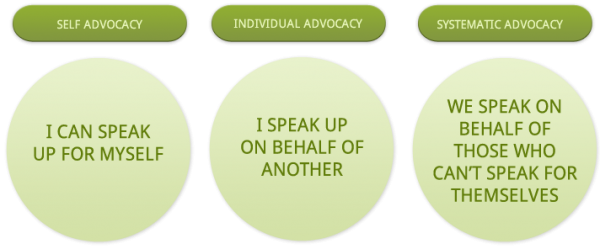
In addition to increasing the access and supply of healthy and nutritious food available in the emergency food system, ending hunger will take substantial advocacy efforts that influence federal policy and legislation that benefit everyone in our state. Feeding Wisconsin is actively taking part in these efforts. Representatives from our food bank network often speak with legislators and policy wonks, advocating for improved public policies for our friends and neighbors living in poverty and for those living on the brink of poverty.
This is the traditional definition of advocacy, which according to the dictionary, is “pleading for, or supporting a cause or proposal.” We advocate because we are in the business of supporting the cause of ending hunger.
Often, people can find this definition a little scary. That's why we employ an expanded definition of “advocacy,” which is to simply storytelling. We create a space for our friends and neighbors to tell their stories which empower them to make positive change in their personal lives.
As a society, we have these hardcoded narratives about people with low-incomes that are often untrue and do not take in the complexity of their lives. If living with low-incomes is not hard enough, they also live in a shadow of misunderstanding that society places on them. This shadow that these untrue narratives casts is disempowering and makes it difficult for people to stand up for themselves to say what they really need. That’s why it is a priority for us to help our friends and neighbors realize their own voice.
On our FoodShare Helpline, we believe in interacting with clients on a personal level. We talk to people who may need just a little help and allow them to explain their circumstances, and provide a space to tell their unique story.
We highlight their strengths and note their need. We make referrals to resources in their community and educate them on their rights.
As advocates, we don’t make decisions for clients or speak on their behalf, but instead, we provide a space that empowers them to apply for programs that they are eligible for, and we act as a resource if their case is denied, questioned, or applied incorrectly.
Instead of advocating for a customer, we advocate with a customer. When our neighbors do enroll for their benefits and receive the assistance they need from our program, they express gratitude, and are often surprised at the positive experience they had with us.
For example, Sharon, a retired 75 year-old resident of Winnebago County called our Helpline looking for a helping hand. She wanted to apply for FoodShare but was uncomfortable going to the human services building her town.
In describing her situation, she expressed embarrassment, diminished pride, and helplessness. Having never asked for financial assistance in the past, she felt ashamed of calling for help. After explaining the FoodShare program, its benefits, and explaining the application process, she asked for help completing an application.
We talked through the application together, step by step. By the end of the process, she expressed, “I didn’t realize how easy the application process is.
"Thanks so much for helping me through this tough time. You made this so easy and you were so friendly and easy to talk to. I almost gave up on applying. Thank you”, she said.
Sharon is now receiving FoodShare and is able to live a healthier, more stable life.
We all have a role as advocates. You may be gifted at dialogue and persuasion, in which case lobbying may be your contribution. A friend or neighbor may need someone to speak on their behalf, and advocacy can be provided that way, too.
Other times, people like Sharon just need a guiding hand, which is the role that we take with our FoodShare Outreach Program.
Use your skills et and advocate for a cause and the people affected by that cause, and you may find that you can make a bigger difference than you originally thought.
September is Hunger Action Month. What advocacy role will YOU take this month?
Read MoreFeeding Wisconsin Expands FoodShare Outreach
Posted by John Stuligross in on Mar 2, 2016 Tagged:
As the statewide association of Feeding America food banks, Feeding Wisconsin is committed to serving the needs of Wisconsinites to help end hunger in the state. Recognizing that over 70,000 of our friends and neighbors are eligible for FoodShare but are not claiming their benefits, our FoodShare Outreach program aims to provide high quality application assistance and advocacy.
Since October, Feeding Wisconsin has been advertising its FoodShare Helpline to food pantries and other partners. The helpline explains the FoodShare program, benefit levels, application requirements, and screens callers to see if they may or may not be eligible for FoodShare. If it appears that a caller may be eligible, we set up appointments with one of our specialists to complete a FoodShare application with the caller. We never turn anybody away or discourage people from applying, and our services are free of charge.
Replicating the best-practices established by Second Harvest Foodbank of Southern Wisconsin, we have seen a rise in call volume from western, eastern, and northern Wisconsin from communities that were previously unaware of our services.
Feeding Wisconsin and its member food banks have increased efforts across the state to help inform, educate, and provide assistance to neighbors in need. FoodShare Outreach Specialists from Second Harvest Foodbank of Southern Wisconsin, Feed My People Food Bank, and Feeding America Eastern Wisconsin now cover 24 counties in the state to provide confidential and high quality assistance with the FoodShare application process and navigating the ABAWD work requirement. Together, with our toll-free FoodShare Helpline, we have assisted over 2,500 Wisconsinites with questions, advocacy, and application assistance over the past 6 months.
Second Harvest Foodbank continues to lead the charge, providing in-person assistance in 16 counties and assisting nearly 300 people with FoodShare applications per month. Feed My People Food Bank has assisted in the completion of over 100 FoodShare applications since December 1, and has educated over 700 people about the program! The Feeding Wisconsin helpline has assisted over 57 applications over the phone where our in-person specialists are unavailable. The helpline has been receiving calls from all counties in the state!
In addition to our expansion of new in-person and phone assistance, we have begun an exciting Google SNAP project in many parts of the state. When people use google to search for "food stamps", "QUEST card", "food assistance" or a number of other key phrases, one of the search pages is a contact form. Once filled out, our helpline can call people across Wisconsin to help inform, educate, and assist folks with FoodShare applications.
We continue to look for innovative partnerships and tools to help connect eligible Wisconsinites with benefits to help them lead healthy, happy lives. Check out Feeding Wisconsin's FoodShare Outreach team members!
Read More
Webinar Announcement: FoodShare Outreach with Homeless Populations
Posted by John Stuligross in on Mar 1, 2016 Tagged:
Webinar Announcement: FoodShare Outreach with Homeless Populations
Conducting FoodShare outreach and application assistance for homeless populations requires a unique approach. Join us on Tuesday, April 19th at 2pm to learn how FoodShare Outreach Specialists are working to meet the needs of homeless Wisconsinites. *Register here*
Presenters
Sarah Hyman - Sarah conducts FoodShare Outreach in Dane, Dodge, and Jefferson Counties. Sarah is bi-lingual, offering application assistance in both English and Spanish. Sarah has been connecting clients with FoodShare since January 2014. Sarah’s background is in community organizing and in food and water issues. Sarah loves connecting new people and community organizations with FoodShare.
Sara Lynn Nelson - Sara Lynn conducts FoodShare Outreach in Rock, Lafayette, and Green counties. She has been working as an Outreach Specialist since October 2014. Sara Lynn is also bi-lingual, offering application assistance in English and Spanish. Sara Lynn loves being able to make a positive difference in her community. She enjoys sharing helpful information about FoodShare to people and hearing their stories.
Both have worked extensively with the homeless population and have unique insight in effective communication techniques and outreach strategies.
Sarah and Sara Lynn will share tips, best practices and techniques to better reach and inform homeless populations about the FoodShare program. *Register here*
Read More
Outreach Specialists Turning Lives Around
Posted by John Stuligross in on Mar 1, 2016 Tagged:
Mark from Eau Claire never thought he would find himself in the position that he was in. He never considered that one day he’d be asking for help with getting money for food. However, Mark found himself in rough patch in his life. Like many others, he became addicted to prescription drugs which led to his use of other drugs. His addiction led to the loss of his job and his family.
Mark knew he had to make a change. He was without family, friends, and money. His only source of food was from a monthly food pantry, which was a significant distance from his home and he didn’t have enough money to put gas in his car to get to the food pantry. He went hungry most nights.
After reading about the FoodShare Helpline, he called and set up an appointment with a FoodShare Outreach Specialist in Eau Claire. He mentioned how warm and pleasant the helpline staff was to him. He learned from our helpline and from the Outreach Specialist that help was available to pay for groceries through FoodShare. He also learned about other program that could help with his addictions – the first sign of hope he had in a long time.
For the first time in a long time, Mark was treated like a person. Feeling empowered, Mark applied for FoodShare, BadgerCare, and signed up for the FSET program. What may seem like a simple phone call and a casual meeting with a FoodShare Outreach Specialist often means more to people than we might realize. Being treated with compassion, respect, and humanity can help change one’s outlook on life.
Mark is now sober (and has been for several months) and is taking other actions to move his life in a positive direction. With FoodShare and BadgerCare, Mark has access to food and healthcare for the first time in a long time, and the FSET program is allowing him to find value in himself through work. Mark is a living example of the positive changes that can happen with a little help from strangers.
Read MoreYou're Invited! 2016 Health & Hunger Summit
Posted by John Stuligross in on Mar 1, 2016 Tagged:
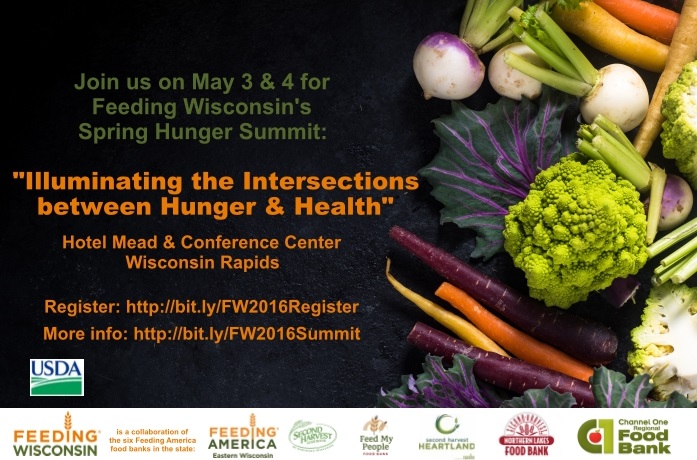
Feeding Wisconsin and its member food banks are hosting a Hunger Health Summit at Hotel Meade on May 3rd and 4th, 2016. Early bird registration is $35 and hotel rooms are at $84. You and your partners are invited to attend!
The conference will bridge the connections between hunger and health, and will highlight some of the tremendous work being done across the state to address hunger.
The summit will have three primary tracks, including Innovation, Health, and Community Partnerships. There will also be FoodShare and SNAP programming that intersect each track. The audience will be made up of hunger relief and anti-poverty advocates, front-line service providers and agencies, healthcare professionals, nutrition educators, funders, outreach professionals, state and local government, and other interested parties.
Early bird registration for $35 ends 4/10. Prices will increase to $50, so sign up now!
Read MoreFoodShare’s Role in the Anti-Hunger Support Network
Posted by John Stuligross in on Mar 1, 2016 Tagged:
FoodShare provides money in the form of a debit-like card to over 800,000 Wisconsinites every month. While it can be a significant benefit to many households, it is only one slice of the anti-hunger pie. We are often asked by FoodShare recipients why they are only receiving $16 dollars per month, as that amount of money will barely supply a week’s worth of groceries. FoodShare is not meant to fully support an individual or family for their food needs. Instead, FoodShare is intended to supplement other sources of income to help purchase groceries.
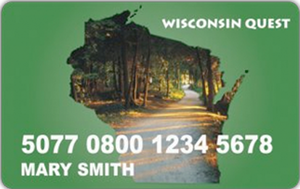
In addition to the FoodShare program, food pantries, government agencies like WIC and job training programs, as well as countless nonprofit organizations all play an important role in the anti-hunger movement. Hunger is a complex issue with social, political, and economic roots. The anti-hunger movement does not begin or end with any one program. Instead, it will continue to take support from these many players, as well as continued support from federal, state and local governments.
While nonprofits, government agencies, and politicians tackle the root causes of hunger, hundreds of thousands of our neighbors are in need of food each month. FoodShare is an important piece of anti-hunger efforts. It is the safety net that provides families the opportunity to purchase food with dignity and confidence at their local grocery store, just like the rest of society. FoodShare provides a consistent and dependable stream of funds to the recipient’s account each and every month, as long as the recipient remains eligible. Its use of a debit-like card gives recipients a sense of empowerment and helps to reduce the stigma that came with the previous adoption of Food Stamps. FoodShare allows individuals and families to make informed, conscious choices about what they are purchasing and eating each month. These benefits are unique to the FoodShare program and make it the cornerstone to the anti-hunger support network.
Read MoreFoodShare Benefits for Blind or Disabled Wisconsinites
Posted by John Stuligross in on Mar 1, 2016 Tagged:
FoodShare is an important program for many of our friends and neighbors in Wisconsin. Eligible households can supplement their budget with monthly deposits into their FoodShare account to purchase groceries. The program is especially beneficial for the 23% of FoodShare recipients that are elderly, blind or disabled. However, applying for and receiving FoodShare can be a confusing process.
In order to be considered disabled or blind for the FoodShare program, the applicant must receive disability or blindness benefits from one of these programs:
- Social Security Administration, Medical Assistance, SSI, or SSI related Medical Assistance, Railroad Retirement Board (RRB)
- Receives a Veteran’s Affairs payment
- Receives a disability retirement benefit from a governmental agency because of a disability considered permanent under section 221(i) of the Social Security Act (Social Security Act requirements of disabled).
Most households cannot have income greater than 200% of the federal poverty level. However, under the regular SNAP rules, households that include a blind or disabled person have no gross income limit, but must have net income that does not exceed 100% FPL and countable assets that do not exceed $3250. In other words, if a household has an elderly or blind individual and applies for FoodShare, and their gross income is above 200%, their net income and assets would also be considered before determining final eligibility.
In general, all types of income are considered in the income test including Social Security, Supplemental Security Income, Social Security Disability Insurance, pensions, and any job-related income.
If a blind or disabled FoodShare recipient has monthly medical expenses greater than $35, then those expenses may be deducted from their gross income. This deduction may allow for an increase in FoodShare dollars for the recipient. In many cases, medical bills and payments are allowable, excluding nursing home care and bills covered by medical insurance. While most FoodShare recipients are required to report changes in their status (income, household size, address, and legal obligations toward child support) by the 10th of the following month, blind and disabled FoodShare recipients are required to report such changes within ten days of the change.
For more information on requirements, policies, and procedures for blind or disabled clients, check out the FoodShare Handbook.
We also encourage you to share our FoodShare Helpline phone number with anybody that is interested in learning more about the program! Our Specialists are just a phone call away: 1-877-366-3635
Read More